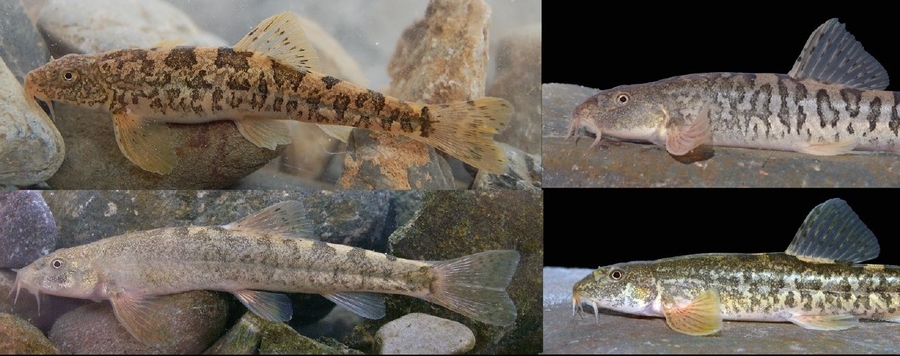
A practical approach to revise the Oxynoemacheilus bergianus species group
The Oxynoemacheilus bergianus species group is revised based on tree topology (ML, NJ, MP), distance (K2P and ASAP) and Poisson tree process analyses of DNA barcode data tested against morphometric and morphological characters including colour patterns. The O. bergianus species group is distinguished from other Oxynoemacheilus groups based on morphological characters: its constituent species have a slender caudal peduncle, a suborbital flap in the male, a mottled or blotched colour pattern, and lack bold, black spots on the caudal-fin base. It is also supported as a monophyletic unit in our molecular analysis. The O. bergianus group includes 10 molecular clades following congruently well-supported NJ, MP and ML based entities. Species described as O. bergianus, O. banarescui, O. erdali, O. fatsaensis, O. samanticus, and O. simavicus from Turkey, O. lenkoranensis from Azerbaijan, and O. longipinnis and O. parvinae from Iran belong to this species group. The group includes also four unnamed molecular clades. We were unable to detect external differences between any of the molecular clades in colour pattern or any morphometric or morphological characters examined. In the 10 molecular clades in the O. bergianus species group, the intraclade K2P distance ranges from 0.0–1.8% while the distances between molecular clades ranges from 0.6–5.9%. To resolve the species diversity of this group, we also analysed the intraspecific and interspecific variability in the K2P distance of DNA barcode data from 53 other Oxynoemacheilus species. Here, the intraspecific variability ranges from 0.0–2.4% while the interspecific K2P distance ranges from 1.2–20.8%. In the O. bergianus species group, only four groups are detected by the mPTP species delimitation approach distinguished by a K2P distance of 2.9% or more. We treat these four groups as valid species, corresponding to O. banarescui, O. bergianus, O. fatsaensis, and O. simavicus. Oxynoemacheilus samanticus from the Kızılırmak and Seyhan drainages, O. lenkoranensis from the Caspian basin, O. erdali from the Euphrates, and O. longipinnis and O. parvinae from the Tigris drainage are treated as synonyms of O. bergianus. Fishes from an unnamed molecular clade from the upper Tigris, and from a second unnamed clade from the upper Euphrates, are both identified as O. bergianus. Oxynoemacheilus bergianus might be a junior synonym of O. bergi from the Kura. The distribution range of O. simavicus, described from the Simav drainage in the Marmara basin, is expanded to the east and two molecularly differentiated population groups occur in the Sakarya drainage, the Büyük Melen River and potentially in other adjacent coastal streams. Oxynoemacheilus fatsaensis, described from the coastal stream Elekçi in northern Anatolia, is also widespread in the Yeşilırmak drainage. Morphological characters proposed to distinguish O. fatsaensis from the other species of the O. bergianus group could not be confirmed by our data on fishes from the Yeşilırmak. This study also discusses the theoretical background, our reasons for conducting this revision in the way we did, and what the alternatives would be.





